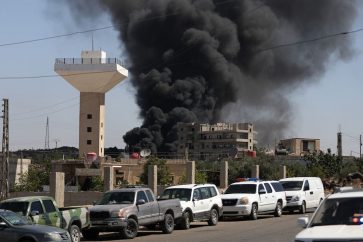The Zionist enemy exploited the 60-day deadline granted for a full withdrawal from the territories it occupied during its last belligerent invasion of Lebanon to commit breaches and attacks that blatantly violated the terms of the truce.
The enemy intensified its crimes, including bulldozing roads, destroying civilian infrastructure, burning homes, and demolishing mosques and buildings across southern Lebanon. Targeting Hezbollah’s infrastructure was merely a pretext used by the Israeli enemy to justify its aggression. Member of Hezbollah’s Loyalty to Resistance bloc MP Ali Fayyad confirmed this to Al-Manar website, stating that the situation in the border area extends beyond merely targeting infrastructure.
The Zionist Enemy Turns the South into a Disaster Zone
Fayyad elaborated: “The enemy seeks to turn the border area into a disaster zone, burned and uninhabitable. What is the connection between the Wazzani orchards—a modern agricultural area spanning 10,000 dunams, featuring almond orchards, grapevines, and vegetables—and the pretexts claimed by the Israelis? Why are they completely destroying them?”
He continued, “The looting and theft taking place are systematic and ongoing. What connection exists between these brutal practices and the Israeli claims about military infrastructure? These actions aim to render the area uninhabitable, complicating its reconstruction and revival for many years to come.”

How Did Hezbollah Deal with the Violations?
MP Fayyad reiterated Hezbollah’s commitment to the Lebanese government’s directives concerning the area south of the Litani River, emphasizing: “We have adhered from the start to the Lebanese government’s directions and respected its commitments toward the area south of the river.”
However, Fayyad criticized the government’s response, describing it as weak and insufficient, and said it has failed to utilize all available tools to deter Israeli attacks.
He added, “Formal objections and limited political contacts are not enough. We need an international campaign where the Lebanese government employs every tool at its disposal to stop and deter Israeli aggression”.

“Furthermore, the government’s stance must be clear and resolute. There can be no compromise, we will not accept the Zionist enemy remaining in our land, not even a single day beyond the sixty-day deadline. The government must declare its categorical rejection of this situation and adopt a firm policy to safeguard Lebanon’s rights and sovereignty”.
Repercussions of Israeli Violations
Ali Haidar, an expert in Israeli affairs, explained to Al-Manar that the Israeli enemy’s reversal of its commitments under the agreement was unsurprising, as it began violating the terms from the very outset. He noted that the Israeli pretexts concerning security in certain geographical areas could be addressed through alternative measures without resorting to these violations.
Haidar suggested the possibility of deploying international forces in geographically sensitive areas and emphasized that the deployment of the Lebanese Army and international forces south of the Litani River, as per the agreement, eliminates any justification for the enemy’s actions.
Asked about the risk of an Israeli attack at any moment, Haidar asserted that the enemy could justify any aggressive move citing “intelligence-gathering” or “security threats.” However, he pointed out that the real issue lies in the actors who align with and adapt to such pretexts, noting that these attacks are part of broader US-backed pressure tactics targeting the resistance in Lebanon.

Haidar remarked that the United States is aware the war failed to achieve its strategic objective of eliminating the resistance.
He added, “Faced with popular and political obstacles hindering the American plan, the US resorts to pressure tactics such as continued occupation of certain areas and repeated attacks.”
Haidar concluded by stating that the resistance would not tolerate the prolonged occupation, explaining that its timing and methods of action depend on appropriate circumstances and data.
Sunday marks 60 days since the ceasefire between ‘Israel’ and Hezbollah took effect on November 27. According to the agreement, the Israeli army was required to withdraw from the territories it occupied in southern Lebanon by this deadline.
The Israeli army has violated the agreement over 1,000 times since it came into effect. These violations aim to project a false sense of victory to its domestic audience and distract from its failure to achieve its objectives during the war. The Zionist entity seeks to convince settlers to return while continuing its aggression. If these attacks persist, will the Lebanese government take decisive action to protect Lebanon’s sovereignty?
Source: Al-Manar Website




